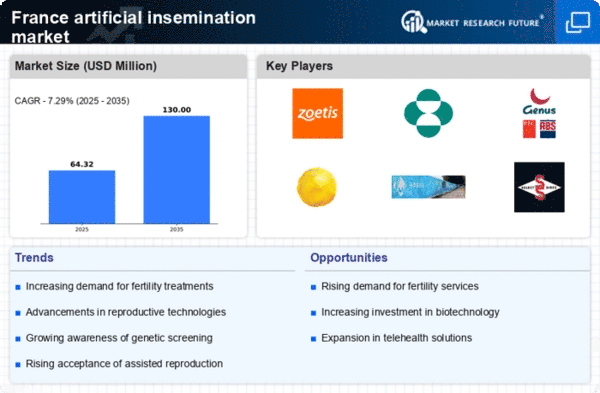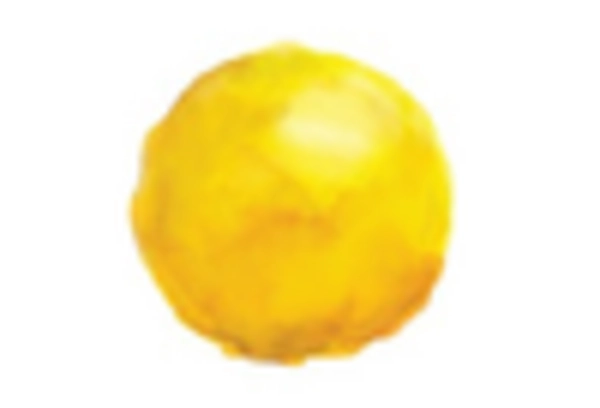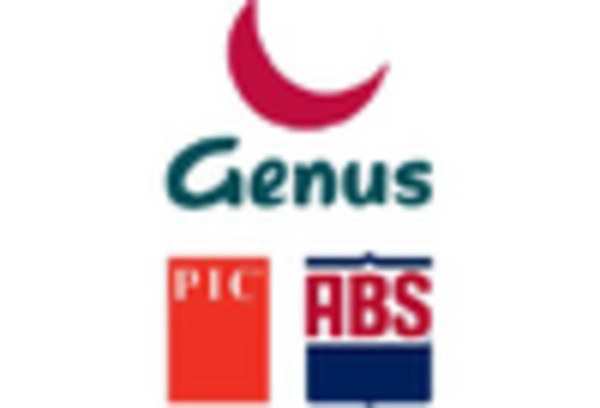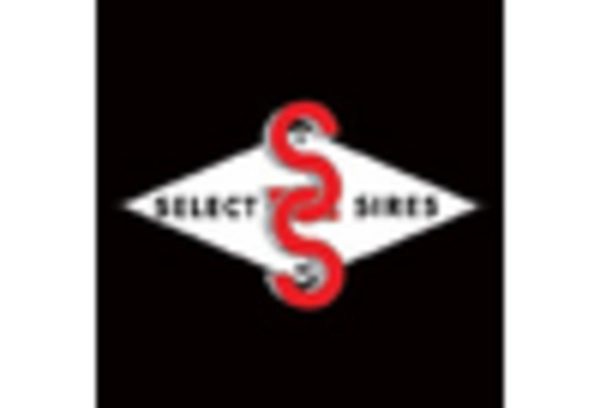Increased Awareness and Education
Awareness and education regarding reproductive health are critical drivers of the artificial insemination market in France. As educational initiatives gain traction, more individuals are becoming informed about their reproductive options, including artificial insemination. This heightened awareness is fostering a proactive approach to fertility, encouraging couples to seek assistance earlier in their family planning journey. The artificial insemination market is capitalizing on this trend by providing comprehensive educational resources and support services. Recent surveys indicate that nearly 60% of individuals are now aware of the various fertility treatments available, a significant increase from previous years. This growing knowledge base is likely to translate into increased demand for artificial insemination services, as more couples recognize the potential for successful outcomes through these advanced reproductive technologies.
Government Initiatives and Funding
Government support significantly influences the artificial insemination market in France. Various initiatives aimed at promoting reproductive health and providing financial assistance for fertility treatments have emerged. The French government has implemented policies that subsidize a portion of the costs associated with artificial insemination procedures, making them more accessible to a broader population. This financial support is crucial, as the average cost of a single artificial insemination cycle can exceed €3,000. By alleviating some of the financial burdens, the artificial insemination market is likely to see an increase in the number of couples seeking treatment. Furthermore, ongoing government campaigns to raise awareness about fertility issues contribute to a more informed public, potentially leading to higher demand for artificial insemination services.
Rising Demand for Fertility Treatments
The artificial insemination market in France experiences a notable increase in demand for fertility treatments. This trend is driven by various factors, including the rising age of first-time parents and increasing awareness of reproductive health. According to recent statistics, approximately 15% of couples in France face fertility issues, leading to a growing reliance on assisted reproductive technologies. The artificial insemination market is adapting to this demand by offering innovative solutions and personalized treatment plans. Furthermore, the societal acceptance of fertility treatments has improved, encouraging more individuals to seek assistance. This shift in perception, combined with the increasing prevalence of infertility, suggests that the market will continue to expand as more couples pursue artificial insemination as a viable option for starting families.
Cultural Shifts Towards Family Planning
Cultural attitudes towards family planning are evolving in France, impacting the artificial insemination market. There is a growing acceptance of diverse family structures, including single-parent families and same-sex couples, who increasingly seek artificial insemination as a means to achieve parenthood. This cultural shift is reflected in the rising number of individuals pursuing fertility treatments, as societal norms continue to evolve. The artificial insemination market is responding to this change by offering inclusive services that cater to a wider demographic. As more people recognize the options available to them, the market is expected to expand, with projections indicating a potential increase in demand by 10% over the next few years. This trend underscores the importance of adapting to changing societal values in order to meet the needs of prospective parents.
Advancements in Reproductive Technologies
Technological innovations play a crucial role in shaping the artificial insemination market in France. The introduction of advanced reproductive technologies, such as in vitro fertilization (IVF) and preimplantation genetic diagnosis (PGD), enhances the success rates of artificial insemination procedures. These advancements not only improve the efficiency of treatments but also provide patients with more options tailored to their specific needs. The artificial insemination market is witnessing a surge in research and development activities aimed at refining these technologies. As a result, the market is projected to grow at a compound annual growth rate (CAGR) of around 8% over the next five years. This growth is indicative of the increasing reliance on sophisticated reproductive technologies to address infertility challenges faced by couples in France.
















